In an era where the demand for renewable energy sources is paramount, PV solar installations are emerging as a pivotal solution to meet both residential and commercial energy needs. With a commitment to sustainable practices and cutting-edge technology, Renaissance Solar is at the forefront of providing top-tier PV solar installations that pave the way toward a greener and more energy-efficient future.
Transitioning from traditional energy sources to PV solar installations offers an array of benefits that extend far beyond the reduction of carbon emissions. At Renaissance Solar, we understand that informed decisions are crucial, which is why we emphasize transparency and educational support throughout the installation process.
Choosing Renaissance Solar for your PV solar installation ensures a clear pathway to harnessing the power of the sun. Our expert team takes an active approach, meticulously planning and implementing each installation for optimal energy output. With PV solar technology, you’re not only reducing your environmental footprint but also enjoying long-term financial advantages through decreased energy bills and potential incentives.
Furthermore, our PV solar solutions seamlessly integrate with your existing infrastructure. Transitioning to clean energy has never been smoother. From the initial consultation to the final connection, Renaissance Solar guides you every step of the way. Our specialists conduct thorough assessments to tailor each installation according to your energy needs and location-specific factors.
Installing a PV solar system is a multifaceted process, but with Renaissance Solar’s expertise, it’s a journey toward energy independence that you won’t have to navigate alone. Through meticulous planning and efficient execution, our installations boast minimal downtime and maximum efficiency.
The time to embrace the power of PV solar installations is now, and Renaissance Solar is your trusted partner in this transformation. As leaders in the field, we pride ourselves on delivering top-notch solutions that blend sustainability, efficiency, and economic benefits seamlessly.
Ready to take the first step towards a brighter, more sustainable future? Contact Renaissance Solar today for a comprehensive consultation tailored to your unique needs. Together, let’s harness the potential of PV solar installations to create a world of energy independence and environmental responsibility. Experience the Renaissance Solar difference – a commitment to excellence in every installation we undertake.
